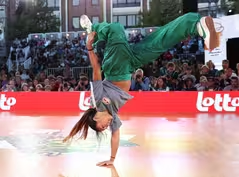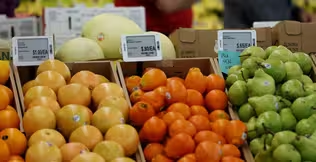
What’s at stake in Venezuela’s crucial presidential election
Clip: 7/27/2024 | 6m 35sVideo has Closed Captions
What to know about Venezuela’s high-stakes presidential election
Sunday’s presidential election in Venezuela could be the country’s most consequential one in nearly a decade, with experts saying nothing less than the future of Venezuelan democracy could be at stake. John Yang speaks with Alexandra Winkler, a senior associate at the Center for Strategic and International Studies, to learn more.
Problems playing video? | Closed Captioning Feedback
Problems playing video? | Closed Captioning Feedback
Major corporate funding for the PBS News Hour is provided by BDO, BNSF, Consumer Cellular, American Cruise Lines, and Raymond James. Funding for the PBS NewsHour Weekend is provided by...

What’s at stake in Venezuela’s crucial presidential election
Clip: 7/27/2024 | 6m 35sVideo has Closed Captions
Sunday’s presidential election in Venezuela could be the country’s most consequential one in nearly a decade, with experts saying nothing less than the future of Venezuelan democracy could be at stake. John Yang speaks with Alexandra Winkler, a senior associate at the Center for Strategic and International Studies, to learn more.
Problems playing video? | Closed Captioning Feedback
How to Watch PBS News Hour
PBS News Hour is available to stream on pbs.org and the free PBS App, available on iPhone, Apple TV, Android TV, Android smartphones, Amazon Fire TV, Amazon Fire Tablet, Roku, Samsung Smart TV, and Vizio.
Providing Support for PBS.org
Learn Moreabout PBS online sponsorshipJOHN YANG: Tomorrow's Venezuelan presidential election could be the most consequential in nearly a decade.
Experts say nothing less than the future of Venezuelan democracy could be at stake.
JOHN YANG (voice-over): The nation's increasingly authoritarian President Nicolas Maduro is wanting to extend his time in the office he assumed in 2013.
PRESIDENT NICOLAS MADURO, Venezuela (through translator): If you don't want Venezuela to fall in a bloodshed, let's guarantee the biggest electoral success in the history of our people.
JOHN YANG (voice-over): Polls show him trailing challenger Edmundo Gonzalez Urrutia by a large margin.
Gonzalez was an obscure retired diplomat with no political aspirations, until a coalition of opposition parties picked him as its candidate.
EDMUNDO GONZALEZ URRUTIA, Venezuelan Presidential Candidate (through translator): I want to call on all Venezuelans to join me in a peaceful and orderly change of government.
JOHN YANG (voice-over): He has the backing of Maria Corina Machado the driving force behind the opposition after winning a primary with more than 90 percent of the vote, the Maduro government banned her from running.
MARIA CORINA MACHADO, Opposition Leader (through translator): This moment we are living is the closing of a cycle of chaos to begin an era of order and stability and security.
JOHN YANG (voice-over): Together they've energized voters by promising to reestablish democratic institutions and the economic and human rights crises that have led more than 7 million Venezuelans to leave the country over the past 10 years.
Many sought refuge in neighboring Colombia and Brazil.
Last year, U.S. authorities encountered tens of thousands of Venezuelans along the southern border.
The polls hold true and Maduro does lose, some analysts are skeptical that he would readily accept defeat and give up power.
Alexandra Winkle is a senior associate at the Center for Strategic and International Studies.
She is also a former Deputy Mayor of El Hatilloto which is one of the five municipalities in Caracas.
Why is this election so important?
Why is it so crucial, and people are watching it so closely?
ALEXANDRA WINKLE, Center for Strategic and International Studies: John, expectations for tomorrow's elections are astronomical, because there is so much at stake.
It's democracy, it's liberty, it's human rights.
It's freedom of association expression.
And I think the most important thing that is on the ballot tomorrow is the reunification of many Venezuelan families who had to be separated because of migration.
As we said at the beginning, there's over 7 million migrant -- Venezuelan migrants already across the world, and people are going to the ballot box tomorrow to bring back their brothers, their sisters, their parents, their kids, because that's what Venezuelans want the most to be back together as a family in a democratic and progressive nation.
JOHN YANG: We saw the pictures of the rally in the tape and also read reports of the rallies that particularly as Machado was holding that she has to sort of sneak in.
ALEXANDRA WINKLE: Yeah.
JOHN YANG: What's creating this excitement, what's creating this, this enthusiasm?
ALEXANDRA WINKLE: People, first of all, I think what's different this time is that there is an opposition that is unified under Maria Corina Machado is like the opposition leader.
And of course, Edmundo Gonzalez who is our candidate, people trust those opposition leaders.
And second, people really want to go to vote tomorrow to make change, to really have their voices heard because they're tired of hyperinflation.
They're tired of food scarcity.
They're tired of not having water, electricity.
They're tired of political persecution of their loved ones.
People want change.
And I think that's why there's so much excitement towards tomorrow.
JOHN YANG: You talked about some of those activities that the Maduro government is doing.
Late last year, the Maduro government and the opposition signed an agreement to reinstate some democratic institutions sort of paved the way for free and fair elections tomorrow.
What happened to that agreement?
ALEXANDRA WINKLE: I mean, the fact is that there has been no free and fair elections.
Maria Corina Machado was chosen in primaries as the opposition leader, and Maduro did not let her run.
She also pointed success for excluding (inaudible) to also run and they did not let her run after negotiations, it was Edmundo Gonzalez Urrutia.
We can't forget that at least of those 8 million, almost 7 million, 8 million migrants that are outside of the country, around four are permitted to vote and the regime did not allow them to register to vote.
So there's 4 billion people tomorrow who can vote from the diaspora who can't vote.
So these are not free and fair elections.
And those conditions have not been respected at all.
JOHN YANG: Will they be international observers tomorrow?
ALEXANDRA WINKLE: I mean, there are a couple of international observers.
But if you see yesterday, the Maduro regime gave orders to deport the different ex-presidents from Mexico, from Bolivia, from Panama, senators from the European Union from Colombia, people were going to go travel to Venezuela and the Maduro regime command was, you know, make sure they get off the plane or don't let that plan kick off, because they don't want the international community to see that they're going to lose tomorrow.
JOHN YANG: With the skepticism of Maduro, whether Maduro would acknowledge defeat, what are the range of responses we might see on come Monday morning?
ALEXANDRA WINKLE: He has shown no indication of wanting to admit defeat, but I think it's going to be very hard to say that he went if polls across Venezuela nationally, internationally are giving Maria Corina Machado and then Edmundo Gonzales, at least a 25 to 30 point advantage.
So it's going to be very hard to actually convince the international community tomorrow that he won.
If there we see massive voters going from Maria Corina and Edmundo and just wanting to represent their votes through this change.
JOHN YANG: I've seen now -- let's say that there may have to be negotiations between Maduro and the opposition are the victors in the election for him to actually leave office.
What are the topics of those negotiate?
ALEXANDRA WINKLE: Anything that the international community can do, or the opposite you can do to create incentives for them to go after they lose, I think will always be positive.
Of course, there will be conversations after the election, because there will be a six-month period of transition in which we hope that the regime will allow a peaceful and orderly transition in order to reach that democracy when they're sworn into the presidency.
So there will continue conversations.
But what's going to be very clear is that the opposition is probably going to win tomorrow.
JOHN YANG: And then the United States and Venezuela haven't had diplomatic relations since 2019.
What are the implications for the United States in this election?
ALEXANDRA WINKLE: So for the United States in this election, migration is on the ballot.
And if we want people to stop fleeing from this country, and stop fleeing from all of this disaster, we really need to stop Maduro.
So I do think that there is a direct correlation with this election.
And if we don't bring Venezuela's prosperity and democracy back then we will see that migration uptick very quickly.
JOHN YANG: Alexandra Winkle, thank you very much.
ALEXANDRA WINKLE: Thank you.
Art and sport of breaking makes its Olympic debut
Video has Closed Captions
Clip: 7/27/2024 | 7m 47s | A look at the art and sport of breaking as it makes its Olympic debut (7m 47s)
How retailers are using digital price tags on their shelves
Video has Closed Captions
Clip: 7/27/2024 | 6m 25s | As more retailers embrace digital price tags on shelves, how will they be used? (6m 25s)
Providing Support for PBS.org
Learn Moreabout PBS online sponsorship
- News and Public Affairs

FRONTLINE is investigative journalism that questions, explains and changes our world.

- News and Public Affairs

Amanpour and Company features conversations with leaders and decision makers.












Support for PBS provided by:
Major corporate funding for the PBS News Hour is provided by BDO, BNSF, Consumer Cellular, American Cruise Lines, and Raymond James. Funding for the PBS NewsHour Weekend is provided by...

